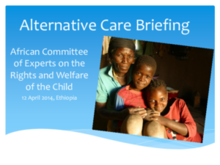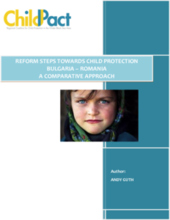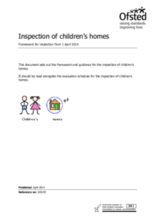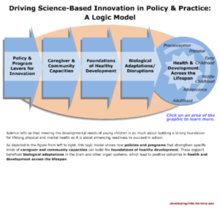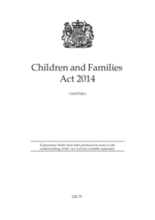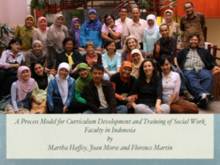Displaying 691 - 700 of 1025
This article provides an overview of the current situation in the out-of-home care in Norway and Sweden. Development in later years is described and discussed, including the trends towards privatization of the welfare system in both countries and the role of private, commercial actors within the care sector including out-of-home care for children and young people.
This presentation, produced by Better Care Network (BCN), International Social Service (ISS), Save the Children, and SOS Children's Villages, was given at a 2014 briefing of the African Committee of Experts on the Rights and Welfare of the Child (ACERWC). The objectives of the Alternative Care Briefing were to increase the understanding of and recommendations on the implementation of the Guidelines for the Alternative Care of Children when reviewing State Party Reports and drafting general recommendations and to create opportunities to promote the Guidelines for the Alternative Care of Children in its 5th anniversary.
This document aims to give a brief outline of the main steps taken by Bulgaria and by Romania in their struggle to reform the national child protection systems. The experience accumulated between the two countries, both in terms of similarities and differences (in terms of approach and level of success) may constitute an important basis of debate and inspiration/ learning for other countries in the region that are sharing similar post-communist heritage and are currently considering ways of approaching their own child protection reforms.
This document sets out the framework and guidance for the inspection of children’s homes in the UK. It should be read alongside the evaluation schedule for the inspection of children’s homes.
This narrated interactive feature presents a logic model showing how policies and programs that strengthen specific kinds of caregiver and community capacities can build the foundations of healthy development.
An Act in the United Kingdom to make provision about children, families,and people with special educational needs or disabilities; to make provision about the right to request flexible working; and for connected purposes.
This introductory article of a Special Issue of Infant Mental Health Journal on Global Research, Practice, and Policy Issues in the Care of Infants and Young Children at Risk provides a useful overview, placing the articles in the broader contexts of research on institutionalized children and different initiatives to prevent inappropriate care, either through addressing the quality of the care provided or ensuring the appropriateness of the type of care environment provided.
This article provide one of the most comprehensive assessments of physical growth, biological markers of growth and nutrition, and general behavioral development, in this case conducted on 286 children under 3 years of age living in 10 institutions in Kazakhstan that were globally deficient.
This article uses data collected from adoptive parents’ postadoption and governmental data in Romania, Ukraine, India, Guatemala, and Ethiopia to focus on domestic adoption in each of these countries. The article highlights both promising practices in domestic adoption as well as policies and practices that require additional research.
This presentation, given at the Social Service Workforce and the Practice of Working with Vulnerable Children and Families Symposium, provides an overview of a child welfare curriculum development and training project for social work faculty in Indonesia.

